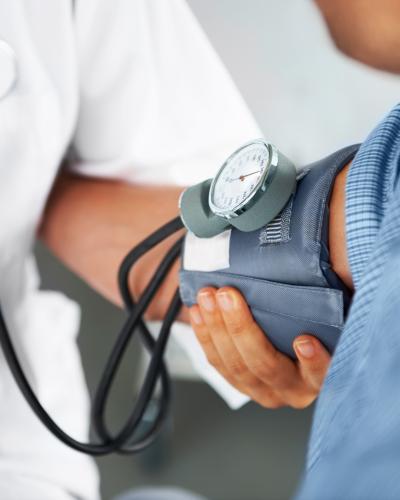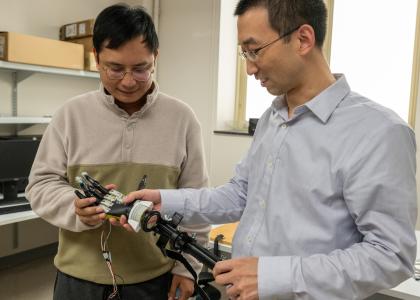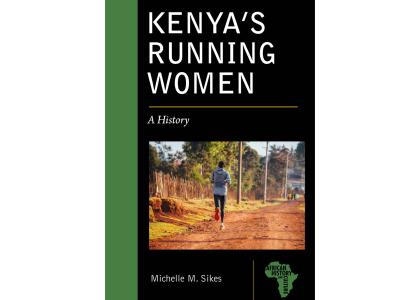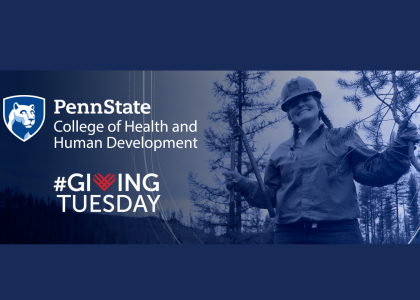Research Labs and Initiatives
Faculty in the Department of Kinesiology concentrate their research in six interdisciplinary areas of study: Athletic Training and Sports Medicine, Biomechanics, Exercise Physiology, History and Philosophy of Sport, Motor Control, and Psychology of Physical Activity.
The department is led by some of the world's most renowned and respected scholars who serve as editors of scholarly journals, on international and national advisory boards, as leaders of important professional organizations, and on scientific review panels for federal funding agencies.
Kinesiology laboratories are primarily based in Noll Laboratory, including the Clinical Research Center, and the Biomechanics Laboratory in Rec Hall.
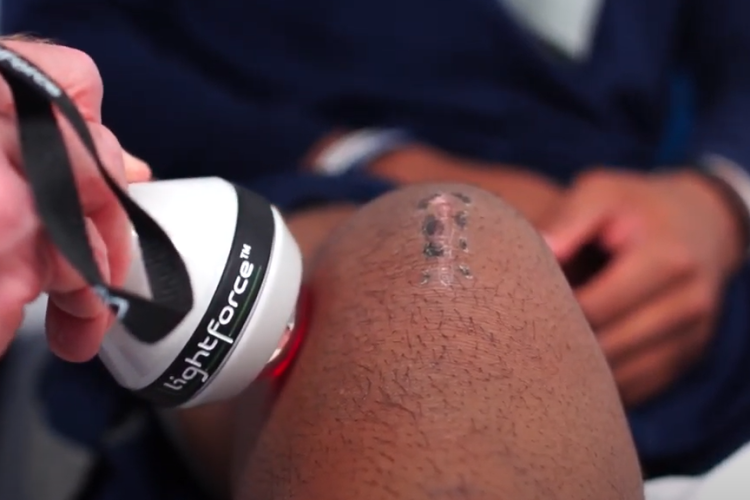
Athletic Training and Sports Medicine
The Athletic Training Research Laboratory studies the delivery of clinical health services to physically active individuals.
Faculty in the group investigate the pathoetiology, prevention, assessment, and treatment of common athletic and orthopedic injuries.
- William E. Buckley - Athletic Training Research Laboratory
-
William Buckley is currently leading a longitudinal study looking at the effectiveness of physical training for law enforcement personnel at the Pennsylvania Deputy Sheriff Training Academy. He is also active in research aimed at creating sport injury risk assessment models for various subset athletic populations (e.g., women, disabled, law enforcement, seniors) and in research that examines drug use or abuse in an athletic setting as it relates to the general notion of the health aspects of sport.
Location: 21D, 21E, 21F Recreation Building
- John Vairo
-
Through inter-professional collaboration, John Vairo's research aims to enhance care of anterior cruciate ligament injuries to optimize health-span.
Location: 21D, 21E, 21F Recreation Building
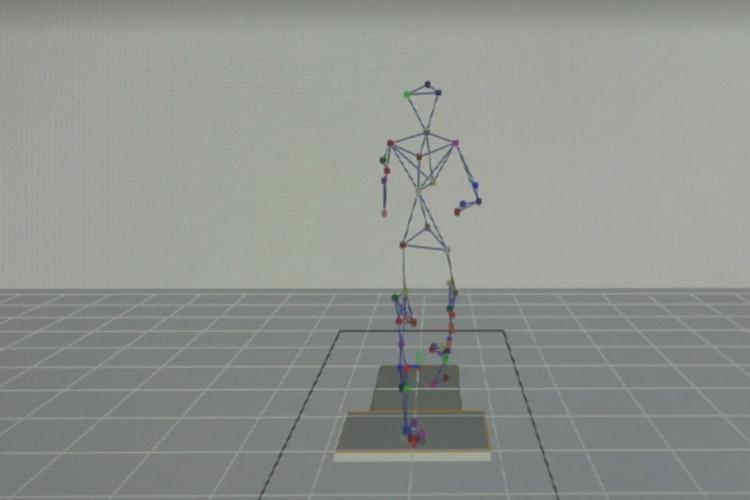
Biomechanics
Biomechanics research at Penn State encompasses several sub-domains of the disciplines.
These include the application of biomechanical principles to motor control and neurological problems, understanding how muscle properties dictate the coordination of movement, exploring the mechanical behavior of musculoskeletal structures at the tissue level, and exploring innovative solutions to orthopedic problems.
- John Challis - Biomechanics Laboratory
-
The Biomechanics Laboratory aims to understand the role of the elastic structures of the foot on the energetics of locomotion.
Principal Investigator: John Challis
Location: 39 Recreation Building
- Jonathan Dingwell - Locomotor Control Laboratory (LoCo Lab)
-
The Penn State Locomotor Control Laboratory (LoCo Lab) is dedicated to understanding the biomechanics and neuromuscular control processes that underlie complex adaptive human movements.
Principal Investigator: Jonathan Dingwell
Location: 38 Recreation Building
- Robert B. Eckhardt - Laboratory for Comparative Morphology and Mechanics
-
The Laboratory for Comparative Morphology and Mechanics seeks to elucidate evolutionary biomechanics within and between generations using data that document normal and abnormal development.
Principal Investigator: Robert B. Eckhardt
Location: 29 Recreation Building
- Stephen J. Piazza - Functional Biomechanics Laboratory
-
The Functional Biomechanics Laboratory is interested in quantifying joint mechanics and understanding how normal, pathological, and surgically-altered joint mechanics and muscle-tendon architecture influence the capacity of muscles to produce movement.
Principal Investigator: Stephen J. Piazza
Location: 29 Recreation Building
- Jonas Rubenson - Muscle Function and Locomotion Laboratory
-
The Penn State Muscle Function and Locomotion Laboratory is dedicated to understanding the biomechanics and energetics of legged locomotion by studying 1) in vivo muscle function; 2) the biomechanical determinants of locomotor energy cost; 3) locomotor optimization.
Principal Investigator: Jonas Rubenson
Location: 12A Noll Laboratory
- Aliza Rudavsky
-
Aliza Rudavsky
Aliza Rudavsky's research examines the relationship between pelvic floor function and the voice. She studies how normal and abnormal function at each end of the trunk affects the other end in singers, performers, women, and athletes.
Location: 21C Recreation Building and 125 Theatre Building
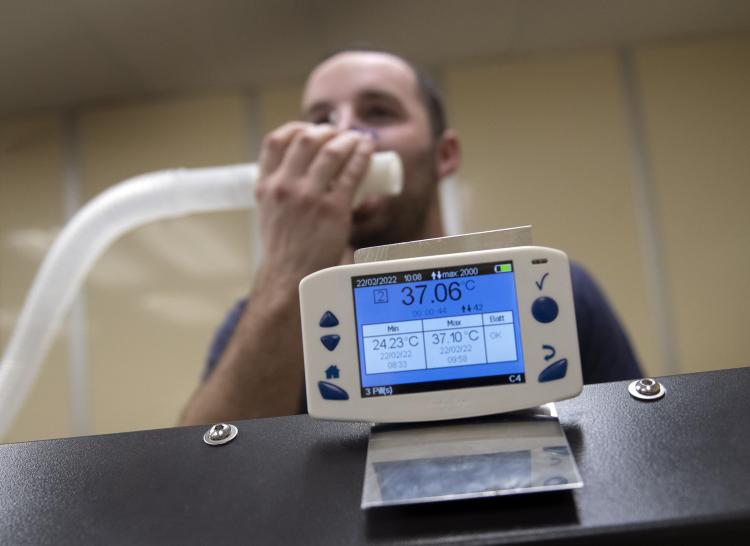
Exercise Physiology
Exercise physiology faculty are dedicated to studying physiology, especially as it relates to health and disease.
They investigate specific physiological mechanisms underlying the positive health effects of physical activity and the adverse health effects of physical inactivity.
The ultimate goal is to improve human health across the lifespan.
- Lacy Alexander - Microvascular Research Laboratory
-
The Microvascular Research Laboratory seeks to understand mechanisms and the impact of interventions on microvascular function.
Principal Investigator: Lacy Alexander
Location: 204, 205, 118, 224, 224A Noll Laboratory and 115 Elmore Wing
- Mary Jane De Souza - Director, Women's Health and Exercise Laboratory (WHEL)
-
The Women's Health and Exercise Lab (WHEL) and Penn State University conducts research focused on the interplay between energy intake and energy expenditure, reproductive function, and bone health in female athletes and recreationally active women.
Principal Investigators: Mary Jane De Souza and Nancy Williams
Location: 109, 110, 112, 116, 117, 122, 124, 206, 207 Noll Laboratory
- W. Larry Kenney - Thermoregulatory and Microvascular Research Lab
-
The Thermoregulatory and Microvascular Research Lab investigates healthful aging in the context of climate change and environmental extremes.
Principal Investigator: W. Larry Kenney
Location: Noll Laboratory Environmental Chambers (228 and 229) and Microdialysis Lab (205)
- Donna H. Korzick - Cellular Cardiovascular Function Laboratory
-
The Cellular Cardiovascular Function Laboratory seeks to understand the innate immune response to myocardial infarction in an animal model of post-menopausal estrogen deficiency to limit cell death.
Principal Investigator: Donna H. Korzick
Location: 225 Noll Laboratory
- Gustavo Nader
-
The Nader lab investigates the transcriptional and epigenetic mechanisms regulating ribosome biogenesis during muscle growth and atrophy in health and disease.
Principal Investigator: Gustavo Nader
Location: 02, 118, 120 Noll Laboratory
- James A. Pawelczyk - Autonomic Neurophysiology Laboratory
-
The Autonomic Neurophysiology Laboratory evaluates the effects of physical inactivity and spaceflight on regulation of blood pressure and cardiovascular function.
Principal Investigator: James A. Pawelczyk
Location: 227 Noll Laboratory
- David N. Proctor - Integrative Vascular Physiology Laboratory
-
The Integrative Vascular Physiology Lab studies how to improve oxygen supply to muscles in exercise, aging, and disease.
Principal Investigator: David N. Proctor
Location: 202 Noll Laboratory
- Nancy I. Williams - Co-Director, Women's Health and Exercise Laboratory (WHEL)
-
The Women's Health and Exercise Lab (WHEL) and Penn State University conducts research focused on the interplay between energy intake and energy expenditure, reproductive function, and bone health in female athletes and recreationally active women.
Principal Investigators: Nancy I. Williams and Mary Jane De Souza
Location: 109, 110, 112, 116, 117, 122, 124, 206, 207 Noll Laboratory
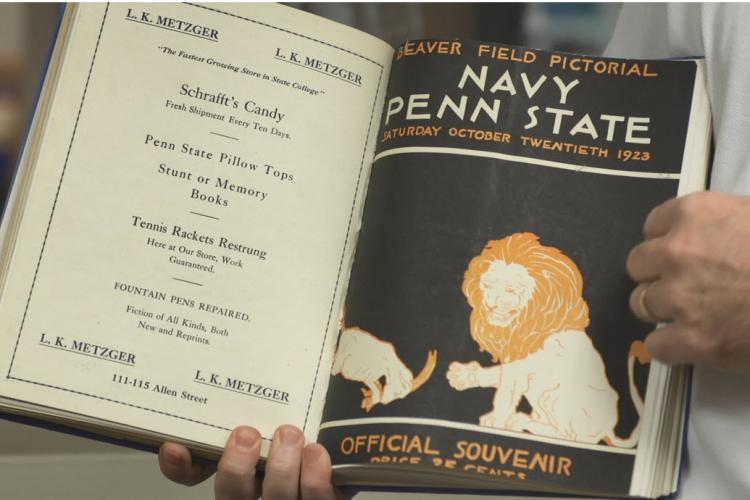
History and Philosophy of Sport
The History and Philosophy of Sport program focuses on the ethical, philosophical, historical, and cultural dynamics that shape sport and physical activity and their meanings in contemporary and historical societies.
Faculty examine how these physical practices intersect with cultural, social, racial, gender, and political dimensions of people's experiences.
- Mark Dyreson
-
Mark Dyreson is a historian of sport who focuses on the intersections of culture, politics, science, race, class, and gender with the traditions of human movement. His current work concentrates on sport in the United States, on the transnational border between the U.S. and Mexico, and on the macro-histories of running.
Location: 268S Recreation Building
- Francisco Javier López Frías
-
Francisco Javier López Frías researches sports ethics, philosophy of games, and bioethics, with an emphasis on performance-enhancing technologies in sport, and is also interested in public health ethics and normative ethics.
Location: 268H Recreation Building
- Jaime Schultz
-
Jaime Schultz's research and teaching interests include historical and contemporary issues in women’s sport and physical activity; cultural kinesiology; and racial politics and cultural memory.
Location: 268M Recreation Building
- Michelle Sikes
-
Michelle Sikes is a historian of sport and how it relates to race, gender, class, and politics. Her current work focuses on politics and sport in African history, women's sport in Africa, and histories of track and field.
Location: 268B Recreation Building
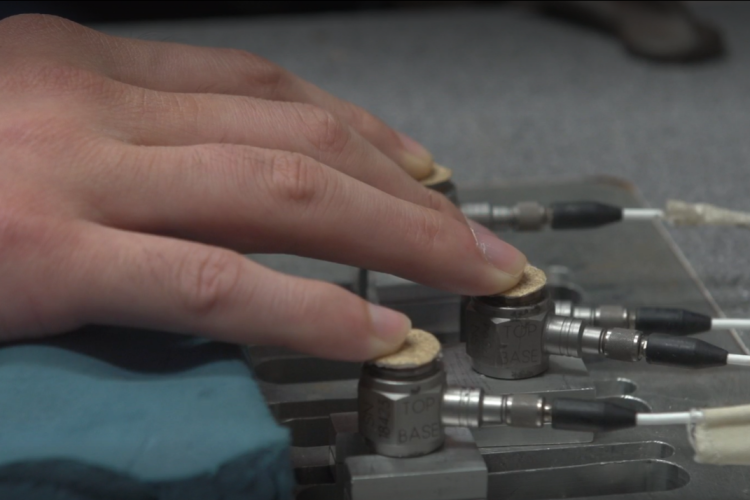
Motor Control
Motor Control faculty examine the cognitive, neurophysiological, and biomechanical foundations of voluntary movements and posture.
Among other topics, faculty study the neural foundations of basic motor control mechanisms in order to understand motor dysfunction and recovery of function.
- Xiaogang Hu - Neuromechanics Laboratory
-
The Neuromechanics Laboratory focuses on neural control of biological and bionic hands. The team develops neural-machine interface and neural stimulation techniques to help restore sensory and motor functions of the hand in individuals after stroke, traumatic brain injury, or limb loss.
Principal Investigator: Xiaogang Hu
Location: 334 Reber Building
- Taewon (Tay) Kim - Motor Learning and Rehabilitation Laboratory
-
The MOtor Learning and REhabilitation Laboratory (MORE) at Penn State explores the theoretical underpinnings of neural mechanisms in motor learning and memory consolidation. The MORE Lab is engaged in translational science, striving to translate this knowledge into improved rehabilitative interventions for individuals with unilateral impairments who need to acquire or re-learn essential motor skills.
Principal Investigator: Taewon (Tay) Kim
Location: 34 Recreation Building
- Mark L. Latash - Motor Control Laboratory
-
The Motor Control Lab (MCL) at Penn State utilizes the research areas of "Equilibrium-point Hypothesis" and "Synergy" to study multi-joint limb movements, postural control, and multi-limb coordination.
Principal Investigator: Mark L. Latash
Location: 20, 21A Recreation Building
MCL also has a related, clinical laboratory, Translational Research in Applied Kinesiology (TRAK), co-directed by Xuemei Huang in the Department of Neurology, Hershey.
- Robert Sainburg - Movement Neuroscience Laboratory
-
The Movement Neuroscience Laboratory investigates brain mechanisms underlying motor control and learning applied to movement deficits following stroke and identifying stroke rehabilitation intervention.
Principal Investigator: Robert Sainburg
Location: 27 Recreation Building
- Tarkeshwar Singh - Sensorimotor Neuroscience and Learning Laboratory
-
The Sensorimotor Neuroscience and Learning Laboratory at Penn State uses robotics, augmented reality, eye-tracking, and electrophysiological measures to study how visual and somatosensory information are integrated by the brain to produce goal-directed movements in healthy adults and individuals with Parkinson's Disease.
Principal Investigator: Tarkeshwar Singh
Location: 23 Recreation Building
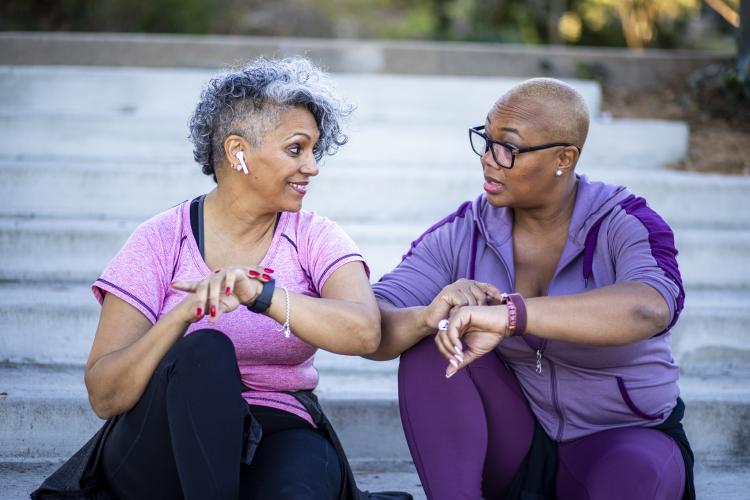
Psychology of Physical Activity
Psychology of Physical Activity faculty study a range of topics aimed to promote physical-activity and human health
including physical-activity behavioral interventions, health disparities, group dynamics, and the neuropsychological aspects of traumatic brain injury in sport. Faculty often leave the lab to study personal and community environments, with innovative research employing personal devices to study health behavior.
- Melissa Bopp - Physical Activity and Public Health Laboratory
-
The Physical Activity and Public Health Laboratory conducts research to understand and promote physical activity in a variety of settings and populations through community-based approaches.
Principal Investigator: Melissa Bopp
Location: 23C Recreation Building
- David E. Conroy - Motivation Lab
-
The Motivation Lab aims to move people to live healthier and happier lives through the development, evaluation, and refinement of evidence-based approaches to behavior change.
Principal Investigator: David E. Conroy
Location: 17 Recreation Building
- Danielle Downs - Exercise Psychology Laboratory
-
The Exercise Psychology Laboratory investigates automated dosage changes to effectively regulate prenatal weight gain by utilizing intensive data collected on each woman to understand her intervention responsiveness and predict future behaviors (and how to translate this process to the real-world).
Principal Investigator: Danielle Downs
Location: 18 Recreation Building; 223 Noll Laboratory
- Semyon (Sam) M. Slobounov - Psychophysiology of Movement Lab
-
The Psychophysiology of Movement Lab studies how concussions affect the brain and motor functions, specifically vestibular and oculomotor functions in athletes.
Principal Investigator: Semyon (Sam) M. Slobounov
Location: 19 Recreation Building
